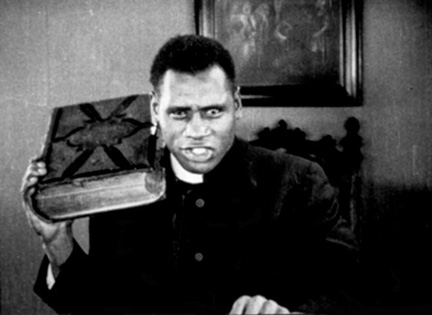This Week You Will Find Pages On:
- silent films vis-a-vis modern horror
- Star Wars vis-a-vis Stalin
- action vis-a-vis self-awareness
- AI music vis-a-vis The Beatles
- a Low tribute.
Thanks to scb0212 and Miller for contributing this week, this will go on their permeant records. Send articles throughout the next week to ploughmanplods [at] gmail, post articles from the past week below for discussion, and Have a Happy Friday!
Daniel Schmidt participates in a Metrograph screening recommendation, and advocates Paul Robeson’s debut in Oscar Micheaux’s Body And Soul:
In the stillest moments of this horrifying moral tale, Robeson’s false preacher flickers with an eerie resemblance to another night-terror vision of lore: The Hat Man. This legend has recently been exhumed by post-creepypasta culture, and it’s striking to me how much online esoterica is indebted to early cinema and the first filmed nightmares—the marriage of new mediums to supernatural malevolence—often visualized as fragile, silent and degraded. Body and Soul, Machine and Ghost, etc. I wonder when we’ll have the A.I.-generated voice of Robeson emanating from his preacher’s mouth, threatening damnation.
Rolling Stone‘s Brian Hiatt interviews showrunner Tony Gilroy about Andor and the historical inspiration for figuring out how to fund a group of rebels:
There’s an amazing book called Young Stalin [by Simon Sebag Montefiore]. The opening chapter is this incredible [potential] movie sequence where Stalin is part of staging a major bank robbery in a Georgian town in 1907. It involves 15 people and hookers and teamsters and all these things. Stalin was Lenin’s financier. He was a thief. And the reason Lenin loved him so much was he kept bringing the money. They needed money. This shit all costs money. People gotta eat, they gotta get guns. You gotta get stuff. It’s knowing that and wanting to say something about that. Almost no one ever pays attention to that part of it. It’s an underutilized area of storytelling. I’m always obsessed with what my characters make and where they’re getting their money.
At Secret Handshake, Brandon Streussnig looks at Scott Adkins’ latest movie Accident Man II: Hitman’s Holiday and what the DTV star understands about action filmmaking:
In today’s action landscape, where so much of the humor is irritating and self-aware, Hitman’s Holiday refreshingly trades on sincere goofiness. Like Inspector Clouseau, [Adkins’ character Mike] Fallon has an assistant that he pays to attack him when he least expects it to keep him on his toes. There’s a killer clown with a mallet who can’t feel pain, so Mike goes to increasingly ridiculous lengths to hurt him, capping each blow off with “C’mon, you felt that! Right??” It’s Tom & Jerry tomfoolery with nary a wink or a nudge. Adkins seems to understand something that Hollywood doesn’t: undercutting your own brand of insanity with in-jokes serves nobody, and often makes you seem embarrassed by what you’re making. If we can accept wild set pieces and even wilder kills, we’ll likely accept a Ghanan Vampire (one of the many over-the-top assassins) who thinks Mike’s blood is too dirty to even consider drinking.
Sam Adams eulogizes drummer and singer Mimi Parker of Low, paying tribute to her musical ability and her life as a working artist:
Low never had a career-defining hit—the closest they came to a commercial breakthrough was when their ethereal version of “The Little Drummer Boy” was featured in a Gap ad. But rather than be discouraged by their modest success, they chose to be liberated by it. “It kind of saved our asses … that we were not successful,” Parker told an interviewer last year. “It’s given us freedom to surprise ourselves and others too.” That lack of commercial success made the band’s continued existence a choice the duo had to make rather than a foregone conclusion. And so the fact that they chose to continue, and then kept on making music without compromise or complacency—while staying married and raising two children—feels like a decades-long testament to the possibility of making art and a life at the same time.
And at Vulture, Lane Brown reports on how Peter Jackson’s crew de-mixed The Beatles so they could re-edit a documentary and issue headache-free stereo versions of their albums:
A few years ago, the Lord of the Rings director was hired to sift through 60 hours of unused footage from the 1970 Beatles documentary Let It Be and cut it into his own movie — 2021’s Get Back. Large sections of that footage had been marked as unusable because the band’s conversations were drowned out on the mono audio tapes by the sound of their instruments: John, Paul, and George had deliberately hidden their sensitive discussions from the original doc crew by noodling on their guitars. Jackson asked the engineers at his production company, WingNut Films, to see what they could salvage, and so they developed their own machine-learning “de-mixing” software capable of splitting up interlocked sounds.


